Dario Španović, Sara Žurovski and Emilija Major created Soko Kamp to empower children and help them develop an interest in nature-based activities and outdoor values.
By creating nature-based activities and initiatives, organising summer camps with various activities such as sports, creative games and teamwork. These camps last 4 days, from Thursday to Sunday, and take place outdoors, with tents and campfires. Occasionally, they can plan birthdays in nature when parents request it, as an alternative to indoor celebrations.
In order to highlight their activities and recent news, RISE recently had an interview with them.
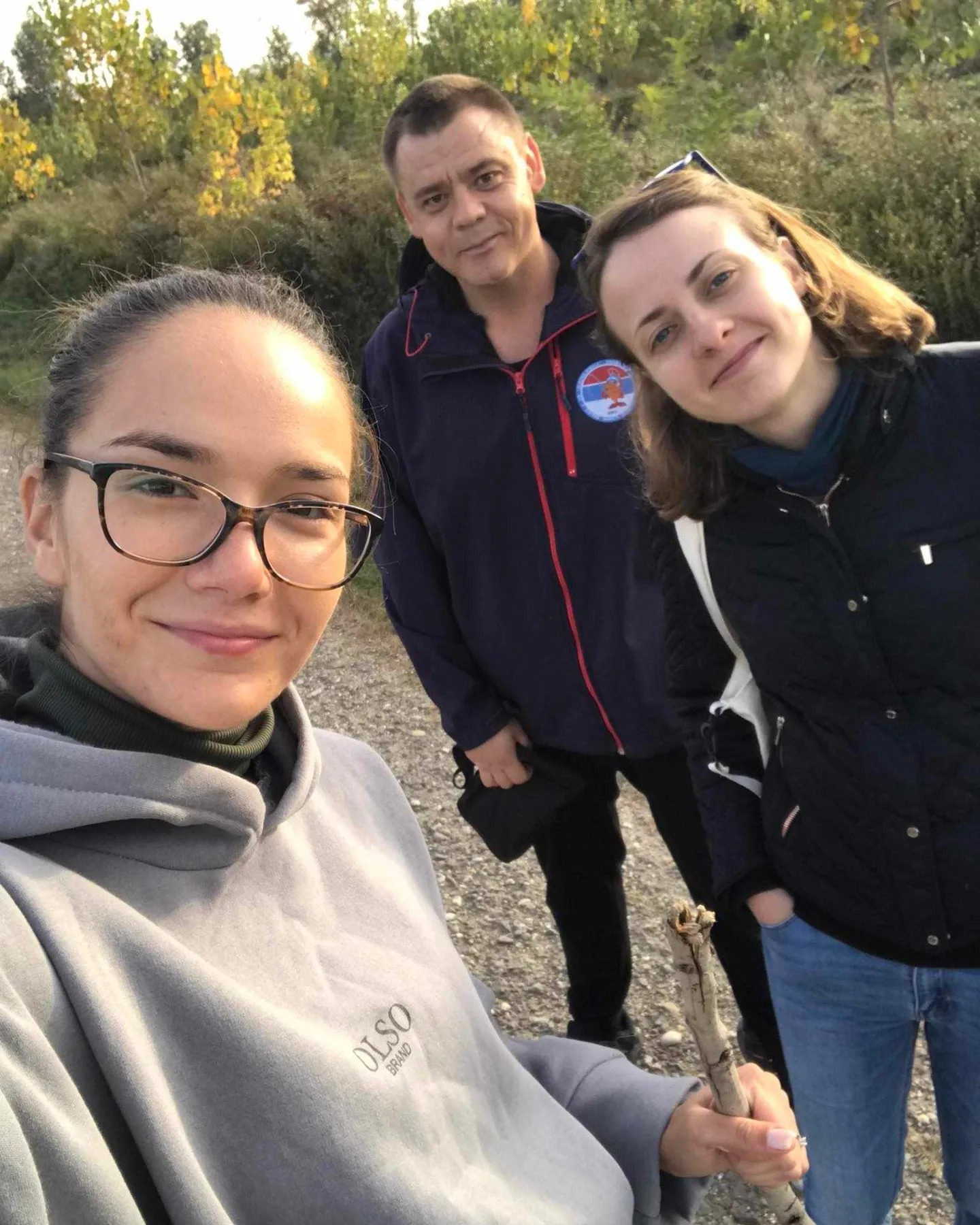
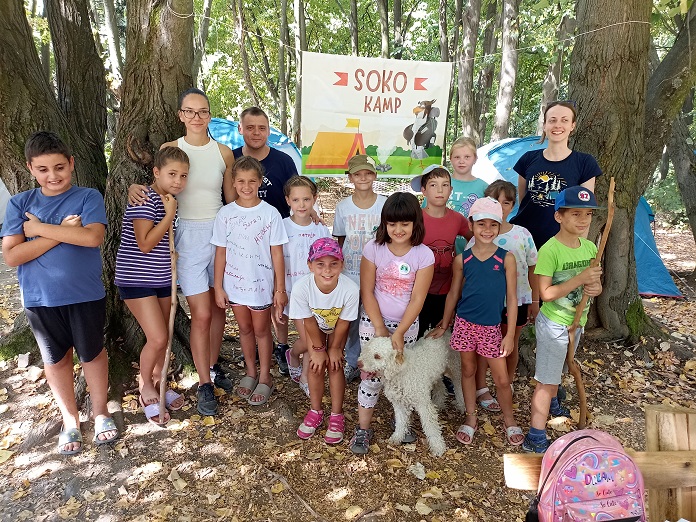
Hi Sara and Dario, thank you for accepting this interview. As an introductive question, can you describe yourself, your professional activity, and your social company ?
We started project Soko Kamp, in which we are trying to understand and empower children in their young age to gain more interest in nature activities and outdoor values. Our main projects are creating activities and initiatives in nature with them. We organize summer camps, where we go with groups of children in the forest and have diverse activities that involve sport, creative games, teamwork etc. We spend 4 days with kids with a real outdoor setting, sleeping in tents, starting a camping fire, stuff like that. Through these initiatives, we are trying to wake up the interest for the nature and withdraw their attention from the digital medias to redirect them to the outside world. It’s one of the social values, see the problem of digital medias amongst children and their influence on social and physical development and decrease this influence of social medias. And create their interests for the things that are not phones and tablets.
During summer we have camps, but every month we have workshops in the nature for children, usually it’s Saturday or Sunday, go to the lake or river and fishing etc. making food in the nature. That wasn’t our first idea but we have good feedbacks for the parents and we started to organize these things more often. We also plan few birthdays sometimes, parents call us and ask if it’s possible to organize them in the nature, instead of some close space.
And while leading those activities, do you observe any change on children’s behaviour or apprehension and comprehension of nature, their opinion on outdoor activities change ?
That depends on the children, some are less interested and less curious, exploring type of persons. But for most of the children who come to our camp, we manage to create sparkles in their eyes, “oh what is this?”, they play in the mud, run in the forests, do things freely and it’s very spontaneous. We also have comments on children’s insights, usually they tell us that time passes slowly outdoor, while at home, when they play videogames, it goes faster.
They understand that in nature everything is calmer than when they are spending time in the digital world. They also share us few comments and want to know when is the next time they go camping, that they should do this with their friends or parents etc. Most of them are appreciating the way life in camps goes, but few of them are less interested, less amazed, they discover it but it might not be their cup of tea, they don’t have the “Wow”.
Can you describe us a typical schedule plan for organizing your camps ? For example, you will begin your summer camps in the end of June, how do you plan the sessions, activities, invite people to participate etc.
We have our camps in end of June, July, and August. It’s always different because we have regular feedbacks and every average age of children is involved. Most of the children are from 7 to 10 years old, less from 13 or 14, I think teenagers might be less interested. We create our activities depending on the age of children involved in it, there are always 12 children in every camp. If they are older, there are less sport activities, if they’re younger, we make shelters, painting, something like that. It’s a surprise because in the beginning, we thought there would be mainly children aged around 13, but it wasn’t true in the end. For every camp, we spend 3 days 4 nights together, we have planned schedule for every day, and we change sometimes depending on who are our volunteers. During the weekend, we have volunteers who create their own workshops for children. They tell us what they want to do, and sometimes we recommend to change some things but it’s mainly organized by them.
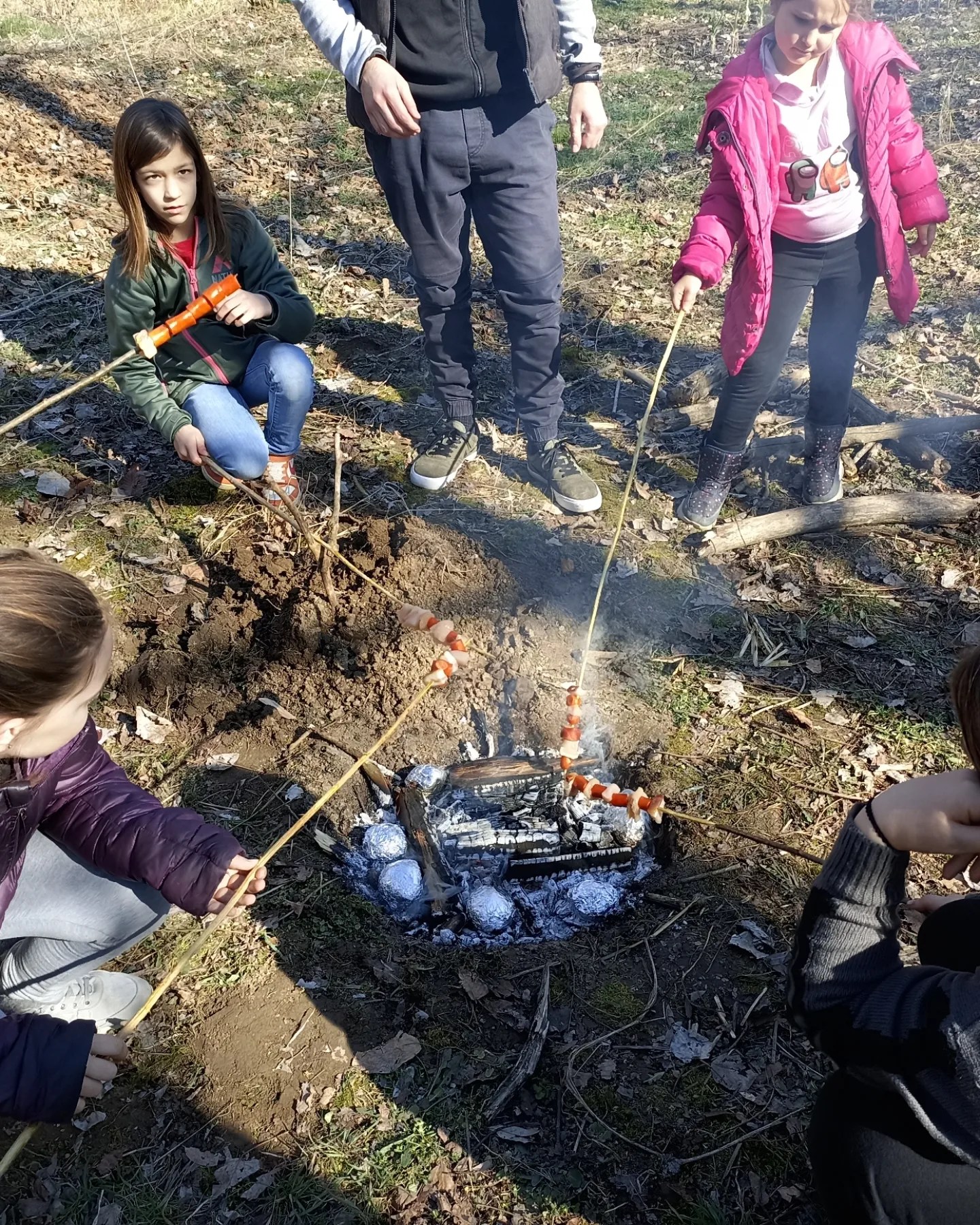
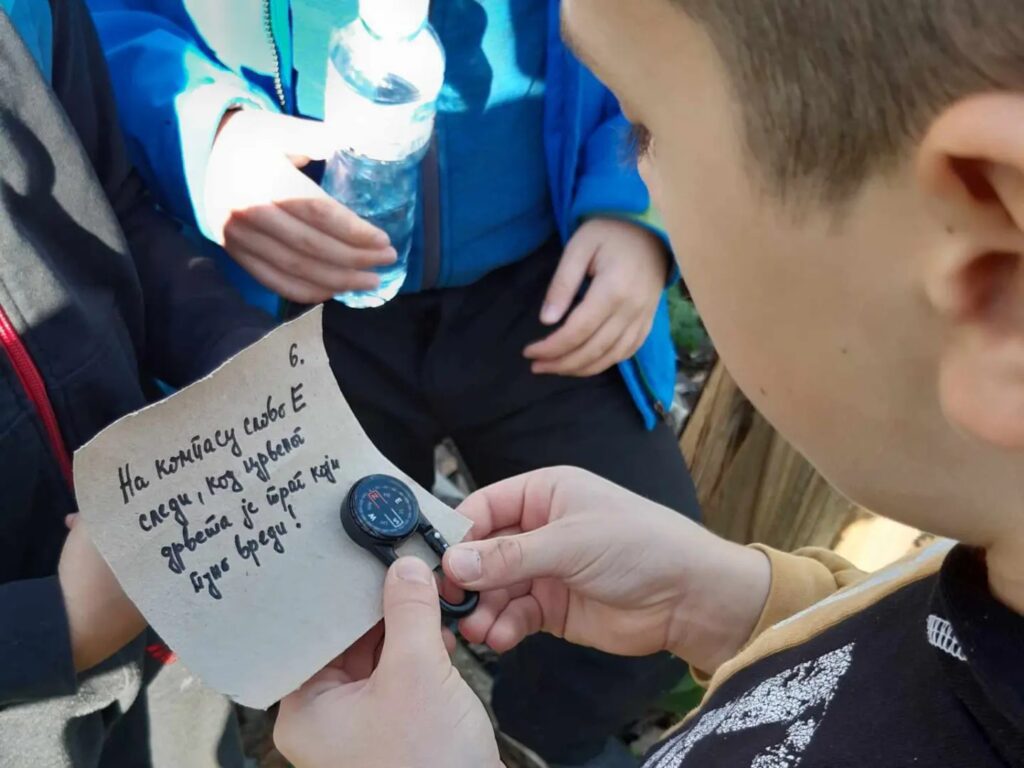
I saw you had appeals for volunteering in your medias. I wanted to know how you managed to organize your recruitments with volunteers ? Are they people from the region, foreigners ?
Most of the time, volunteers are from their town and region. They come on Saturday and Sunday because they all have jobs. We have a problem to get volunteers on Thursday and Friday, when the camps start. We then try to recruit some of them which are over 18, last year we had a young person from a medical school from one town who was on vacation. This year we had some students from economical and medical school, they don’t have yet started to work so they can help for 4 days.
For the recruitment, some come from our town and some others come from other places of Serbia. Last years we had girls who came from Apatin [North-Western Serbia], they found our Instagram, contacted us. We asked them to fill a form, most of the time we ask if we have previous experience with children, what are their motivation on applying for this camp, if they’re used to camping in tents, what kind of skills and talents they have to offer. It depends on the answers. We then sometimes make a videocall, to meet each other, it depends on the impressions but actually, we never rejected any person who applied. Most of them already had a previous experience, and they know it won’t be that confortable. They would have to deal with mosquitos, bugs and things like that.
You also recently organized a coastal cleaning campaign next to the Sava River ? What motivated you to do this and would you plan doing such operation again ?
This was our initiative that was created for the project, it was called “let the river Sava be blue”, it was started thanks to the “Foundation of Ana and Vlade Divac”, they are supporting the young people in the communities and financing initiatives. We organized few workshops in the elementary school, we presented green, eco values to children, explained them why rivers are important, why we should clean and take care of them. Then, after this workshop, we began the coastal cleanup of some parts of Sava river. Maybe we would organize it again, but for this time, it was more a part of a bigger project. We were promoting why our rivers should stay clean and the cleanup was the “ending product” of all this campaign. If we come up with a similar project or idea, we would do it again for sure.
This coastal cleaning project wasn’t just for children, it was for all citizens. Lot of children came with their parents, adults were also interested into helping, regarding the fact that the river is going through our city center. We had nice effects in schools. When it was about teaching how to recycle, put the trash in the good containers, children got very interested by this.
About recycling generally, is there any initiative related to this in your city ?
Not many activities are related to recycling in our city, Sremska Mitrovica, some of them are led on a state level but not especially in our city. However, the municipality installed some colored containers for recycling, people try to select it but it’s complicated, we are all pretty unsure of where it is going. There are but we don’t know the ending of it, usually the containers are in front of schools or factories, in front of the city council, but not so many in people’s street but usually on public spaces.
We have a recycle factory in our town but they have a lot of problem because people don’t put the right trash in the right bin, which makes the process even more complicated.
So it is more about how to raise awareness of people regarding this question ?
Yes, in the school we make small containters in the same colors of the public ones, we give children fake garbage and let them choose the right color.
This coastal cleaning project wasn’t just for children, it was for all citizens. Lot of children came with their parents, adults were also interested into helping, regarding the fact that the river is going through our city center. We had nice effects in schools.
Great, thank you. Another question more related to your Soko Kamp activities now, but in the end, what do you think misses in promoting your concept ? What were the main issues you faced all along the concrete finalization of your project, whatever it can be.
We had competition with other camps in different parts of Serbia. Some are promoting themselves in the schools, have flyers, posters etc. We know that a certain amount of children are going to take part in these camps, the disadvantages of these ones we are trying to highlight is the prices. For us, they don’t offer the authentic outdoor experience. They have hostels, apartments. Children stay in the comfort zone, they have toilet, everything is clean. They just go to the nature but it’s not as natural as we do, they drive quad bike, it’s very luxury and fancy. Then we are always trying to see how we can promote our values and say we are different to others. Most of the time our camps are not camps that host a lot of children in the same time. We manage to have 12 children maximum.
Our summer camps are different with the others, we are trying to show our way of living with nature, making tents, wood fire. Some parents want to go because they want their children to go on the wood so that they don’t get afraid of mosquitos, bugs, barbecues, things they don’t have the chance to do on going to other camps. Some parents are reluctant to come to our camp, but we have very good feedbacks during Summer camps.
One of our camping is located in one complex called Letenka. There is a field with a playground, but close to this place, there is a kitchen and a toilet. We rent these for our camp sessions, and everyday we cook fresh food for children. I would add that we are a sugar-free camp. Sometimes children don’t want to eat, they want ketchup instead of tomato, but we tell them to eat the food, as long as they’re not allergic –this is something we always ask the parents before–. In the end, everything is good. Additionally there is no screen time for children, they only have cellphones to call parents.
What do you plan do to next for Soko Kamp ? would you consolidate the things that you already implemented or will you try to find new horizons for it ?
For the future lot of parents ask us why we don’t organize it during winter breaks. One major point is that during summer, we sleep in tents; so maybe, we are thinking of planning it to sleep in a lodge, in the woods. For the children, it would not be as authentic as a camping, but there would not be wifi nor electricity. It’s our next plan. We are thinking about this, it’s our next plan, we also want to plan more workshops, for now we have one monthly only, our objective would be to make about 2 for 1 months.
We have winter activities, but one day winter. We had 1 day sliding, making a snowman, snowfight, sheltering in the woods, but it didn’t last very long. We also made a feeding box for the birds during the winter, something like that. We put them in our town and in parks, and it’s great because children go there on other days and add food. Some other do it also for their home, so they send us a picture so that.
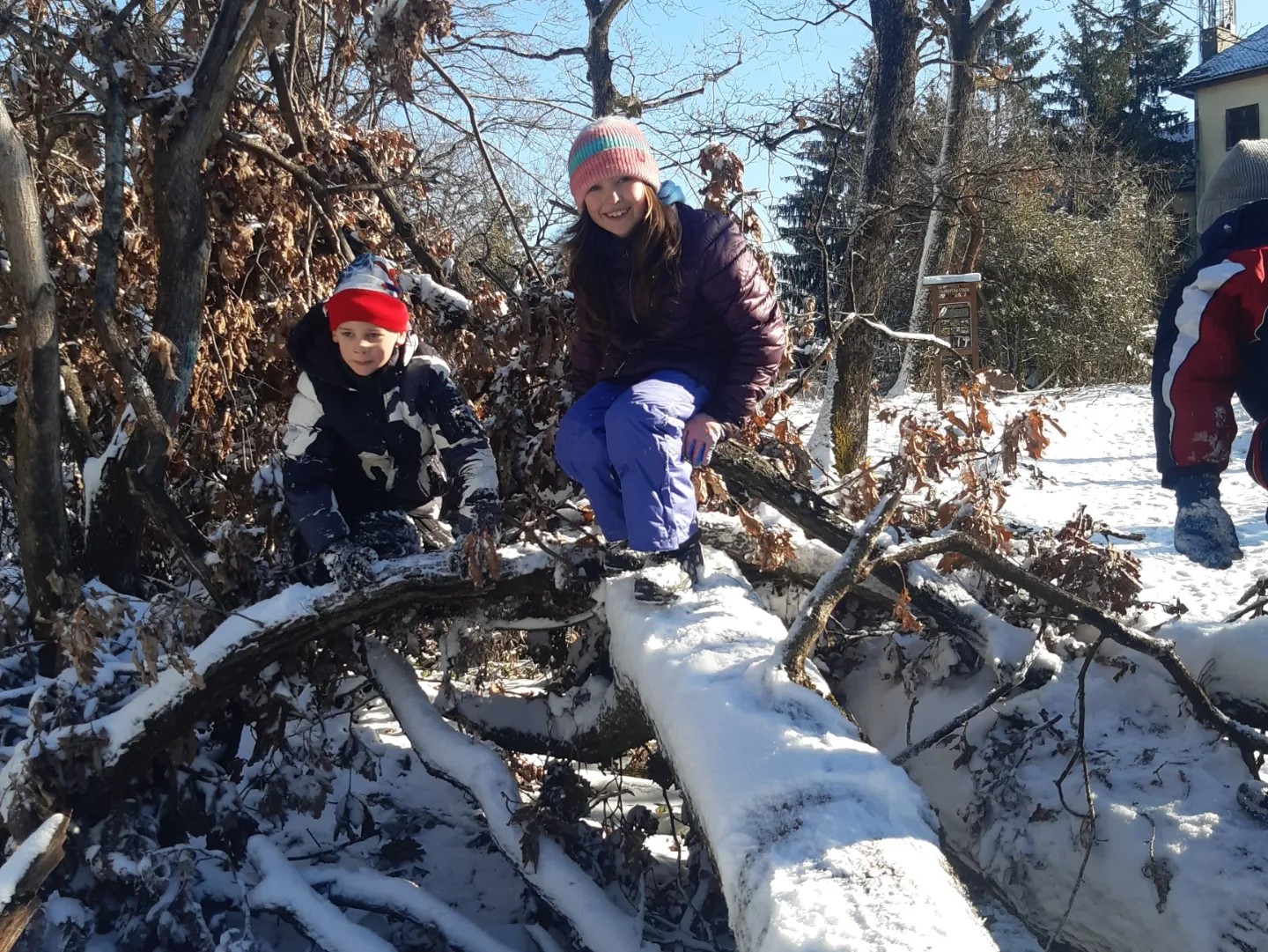
And speaking of these activities, do you have children who came to multiple camps ?
This year we had children who were here last years, and some others would go to some camps we organize for this Summer, it’s great. Many had workshop with fishing, we promote catch and release techniques. After this parents asked to buy fishing rods and licenses for going to the river, maybe he will go fishing and not stay very long on the computer etc.
Speaking of geographic coverage of your activities, do you think of any cultural events related to children’s workshops to highlight, or any other organization you’d think to collaborate with ?
In our region, no, but there are some in our country. We made collaboration with Blatology [NGO which participated with incubator Smart Kolektiv, and which specializes in operations related to mud construction]. We hope this year they’ll come and we could make stuff with children.

